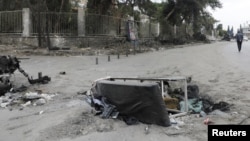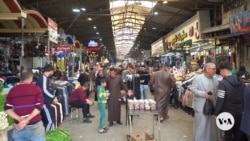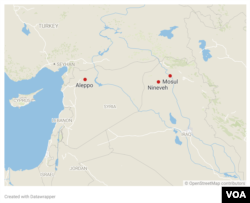With Syria’s second largest city of Aleppo now under control of rebel forces and militants, officials in neighboring Iraq are expressing concerns about potential spillover effects in their already unstable country.
Iraqi Prime Minister Mohammed Shia al-Sudani said Tuesday during a phone call with Turkish President Recep Tayyip Erdogan that “Iraq will not be a mere spectator regarding the grave developments in Syria,” adding that his country “will make all efforts to preserve its security and that of Syria.”
Other senior Iraqi officials have voiced support for Syrian President Bashar al-Assad’s government since it faced swift advances by rebel forces in the northwestern part of the country last week.
Reports have emerged of Iranian-backed Iraqi militias, mostly with the paramilitary Popular Mobilization Forces, or the PMF, moving into Syria in support of the Damascus government.
Rasha al Aqeedi, research associate at the Arab Gulf States Institute in Washington, said official statements and verified footage “indicate Iraqi forces have moved en masse to the borders, but nothing yet shows that any factions have actually entered Syria.”
Watch related report by Kawa Omar:
PMF leaders and other Iraqi officials have denied that any Iraqi armed groups have entered Syria.
Iraq, which shares a roughly 600-kilometer border with Syria, has maintained close ties with the Syrian government throughout 13 years of civil conflict. Baghdad is also a close ally of Iran, itself a key backer of the Syrian government.
Islamic State
Foremost among Iraqi concerns is a resurgent Islamic State, which once controlled vast swaths of territory in both Iraq and Syria.
That group, which also goes by IS, ISIS, ISIL and Daesh, could be motivated to reassert its presence, “to show the world it still exists as its rival factions are active,” said Aqeedi.
However, Aqeedi also told VOA that Iraq would be unwise to move security forces to the Syrian border because that could create a vacuum for IS to exploit in places like Nineveh and Kirkuk, which could become vulnerable to hit-and-run attacks.
According to Mohammed Kakai, member of the Nineveh Provincial Council’s Security Committee, Iraqi military officials in Mosul and its Nineveh Province have already expanded security measures along the Syrian border to prevent violence from spilling over.
“Thermal security cameras have been installed on the entire border of Nineveh Province with Syria,” he told VOA, adding that Iraqi “border guards are ready for any threat on Mosul and Iraq as a whole.”
Kakai added that Iraqi authorities have stepped up coordination efforts with Kurdish-led, U.S.-backed Syrian Democratic Forces, or SDF, who control part of the Syrian side of the border.
“There is a joint operation room between our forces and the SDF. We share intelligence on any threat,” he said.
Saif al-Saadi, a Baghdad-based Iraqi affairs analyst, says there are legal limitations to Iraq’s engagement in the Syrian conflict.
“According to Article 8 of the Iraqi constitution, Iraq must adhere to neighborly relations and not interfere in the internal affairs of other countries and seek to resolve conflicts peacefully,” he told VOA.
He added that the prime minister of Iraq, “who is the head of the armed forces, is required by law to protect the border and prevent armed groups such as the PMF from going to Syria, because this could have adverse effects on Iraq.”
Kawa Omar in Mosul, Iraq, and Balen Salih in Washington contributed to this story, which originated in VOA’s Kurdish Service.







